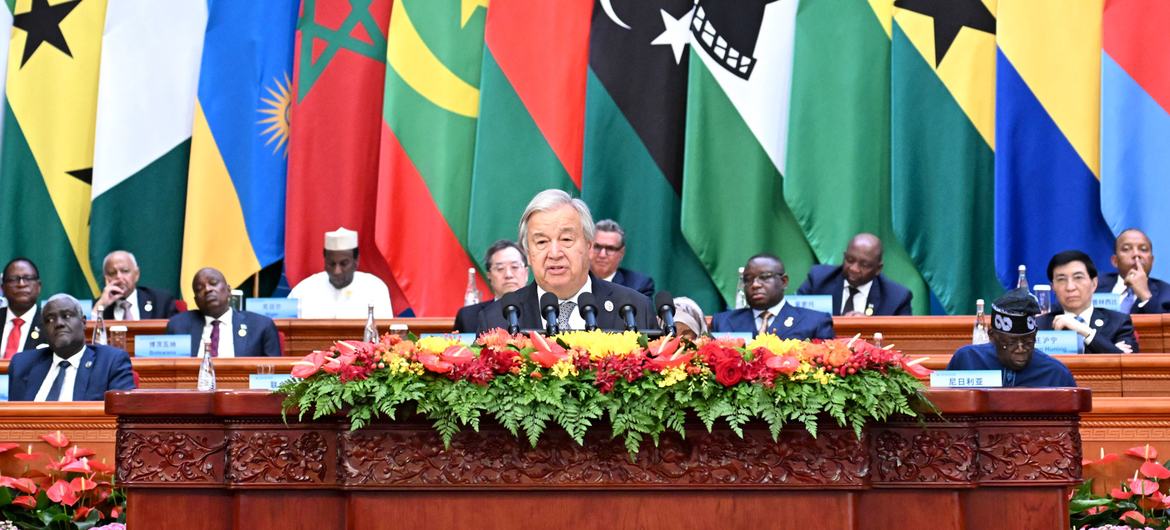By Haruna Gimba
The Secretary-General of the United Nations, António Guterres on Thursday, at a high-level meeting in Beijing, said joint efforts by China and Africa can spark new momentum for development of the continent.
The UN chief underlined the global body’s support for this partnership in remarks to the Forum on China-Africa Cooperation Summit.
Leaders from some 50 African countries are expected to attend the Summit, which has been held every three years since 2000.
Mr. Guterres noted that they were gathering in China amid rising geopolitical tensions, raging conflicts and growing poverty and hunger.
He pointed to current challenges, including the conflicts in Ukraine, Gaza and Sudan, as well as the worsening climate crisis, inequalities and threats to global and African efforts to achieve sustainable development.
“Meanwhile, many African countries are mired in debt and struggling to invest in sustainable development,” he said.
The UN Secretary-General recalled his proposals to reform “outdated, ineffective and unfair international financial architecture”, and to provide a stimulus plan for developing countries striving to make the Sustainable Development Goals (SDGs) a reality.
Solutions include increasing the lending capacity of multilateral development banks and enabling them to massively scale up affordable financing for development.
He stressed that the support of China and Africa for these initiatives is critical.
Progress on shared goals
“In this context, South-South cooperation is essential to build capacities and drive progress on shared development goals – while in no way reducing the responsibilities of the Global North,” he said.
Mr. Guterres described China’s partnership with the African continent as a pillar of South-South cooperation. The process refers to the exchange of technology and skills between countries of the Global South.
“Your joint efforts, based on the United Nations Charter, can create a new momentum for African development,” he said.
He recalled that China is already Africa’s longstanding and largest trading partner.
“And we know that in Africa, as elsewhere, investments are game-changing when they respect national ownership and are financially sustainable, climate-sensitive and consistent with international human rights commitments.”
Furthermore, “China’s remarkable record of development – including on eradicating poverty – provides a wealth of experience and expertise,” he continued.
“The China-Africa partnership can drive the renewable energy revolution. It can be a catalyst for key transitions on food systems and digital connectivity,” he said.
“And as home to some of the world’s most dynamic economies, Africa can maximize the potential of China’s support in areas from trade to data management, finance and technology.”
UN China UN Secretary-General António Guterres with other African leaders at the Forum on China-Africa Cooperation in Beijing, China.
Mr. Guterres also used the speech to highlight the need to “correct some historic injustices”.
For example, it was “outrageous” that the continent of Africa has no permanent seat on the UN Security Council, he said.
In this regard, the Summit of the Future at UN Headquarters later this month “will be a pivotal opportunity for renewal and reform – anchored in solidarity and justice.
The UN chief spoke of the proposed focus on the prevention of and joint approaches to new and emerging threats to global security, building on recent success in authorizing UN-assessed contributions for African Union-led peace operations.
“We are pushing for reforms so that the international financial architecture and institutions correspond to the realities of today’s world and can respond to today’s challenges – particularly those faced by developing countries, namely in Africa. Your full engagement will be critical to finding sustainable solutions,” he said.
Concluding his remarks, the Secretary-General underscored “the full engagement of the United Nations in support of a strong China-Africa partnership, towards our shared goal of peace, sustainable development and human rights on a healthy planet.”




